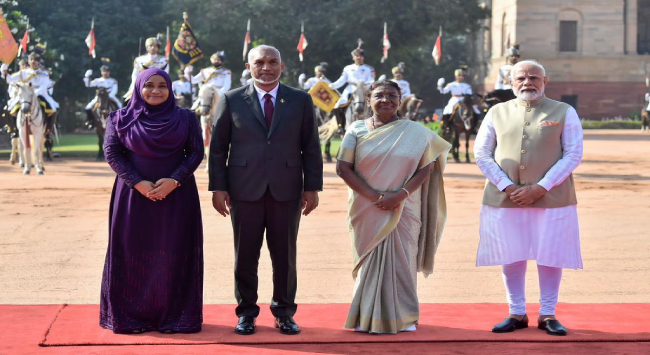Summary
Economic challenges in the country have forced Maldivian President Mohamed Muizzu to reset ties with New Delhi. For strategic reasons, India did not disappoint him.
Confronted with economic challenges, a year after his election, Maldivian President Mohamed Muizzu made his first standalone official visit to India from 6 to 10 October 2024. The Maldives faces a Sukuk debt of around US$500 million (S$642 million). The World Bank estimates that Maldives’ total public and publicly guaranteed debt stood at US$8.2 billion (S$10.7 billion), an equivalent of 116 per cent of the country’s gross domestic product, in the first quarter of 2024. A large portion of the Maldives’ external debt is in the form of loans owed to China, amounting US$1.37 billion (S$1.78 billion), and US$124 million (S$159 million) to India.
Both China and India have extended support to the Maldives. In September 2024, the People’s Bank of China and the Maldivian Ministry of Economic Development and Trade announced a ‘memorandum of understanding’ under a ‘framework for cooperation’ aimed at “promoting the settlement of current account transactions and direct investments in local currencies” and to facilitate smooth trade. In May and September this year, India extended the repayment of two treasury bills worth US$100 million (S$130 million) subscribed by the State Bank of India for another year. Further, an agreement between the Reserve Bank of India and the Maldives Monetary Authority in October 2024 allowed the Maldives to obtain financial support of US$400 million (S$522 million) under the United States dollar/Euro swap window and ₹30 billion (S$465 million) under the INR (Indian rupee) swap window. In early 2024, India also offered a loan of over US$29 million (S$37 million) to the Maldives.
The Island country’s economic condition has forced Muizzu to make a diplomatic reversal. For Muizzu, India is now a “valued partner”. He even denied pursuing the “anti-India” agenda. In response to a question during the Deans Leadership Series at Princeton University’s School of Public and International Affairs in September 2024, Muizzu said, “We have never been against any one country at any point. It’s not India Out. [The] Maldives faced a serious problem with a foreign military presence on this soil…The people of [the] Maldives do not want a single foreign soldier in the country”. Notably, soon after winning the election, Muizzu asked India to withdraw its soldiers stationed in the Maldives to operate two helicopters and decided not to renew the joint hydrographic survey agreement with India.
The Maldives’ ties with India took a deep plunge following derogatory remarks made by three deputy ministers – Malsha Shareef, Mariyam Shiuna and Abdulla Mahzoon Maajid – against India’s Prime Minister Narendra Modi in January 2024. They were suspended with pay. In September 2024, several days before Muizzu visited India, Shareef and Shinua resigned from their positions.
Under the “Vision for Comprehensive Economic and Maritime Security Partnership”, some of the important issues which India and the Maldives agreed upon during Muizzu’s visit to New Delhi were to complete the Greater Malé Connectivity Project, and undertake a feasibility study to connect the islands of Thilafushi and Giraavaru as an extension; collaborate to develop a state-of-the-art commercial port at Thilafushi island to de-congest the Malé port and provide enhanced cargo handling capacity at Thilafushi; initiate discussions on a bilateral free trade agreement; to operationalise the settlement of trade transactions in local currencies; cooperate in digital public infrastructure; and cooperate in energy and health sectors. In matters of defence and security, they agreed that India will support the Maldives in enhancing the surveillance and monitoring capability of the Maldives National Defence Force with the provisioning of radar systems and other equipment. It will also support the Maldives on hydrographic matters, including through capacity building and training and strengthen cooperation in the area of disaster response and risk mitigation. At the same time, New Delhi will soon inaugurate the state-of-the-art Maldivian Ministry of Defence building in Malé, constructed with India’s assistance; and increase capacity building and training slots for Maldivian security forces and police personnel in India. To further enhance people-to-people contact, the two countries have decided to work positively to establish a consulate of Maldives in Bengaluru and a consulate of India in Addu City.
One of the Maldives’ key economic concerns is the decline in the number of Indian tourists to the island country after the disparaging remarks against Modi. As of 8 October 2024, the Maldives has welcomed slightly more than 1.5 million tourists this year. China’s market share was 15 per cent, while India’s contribution has plummeted to 6.1 per cent of the total visitors. In New Delhi, sharing the dais with Modi, Muizzu said, “India is one of our largest tourism source markets, and we hope to welcome more Indian tourists to the Maldives.” Then, speaking at the India-Maldives Business Forum in Mumbai, Muizzu reiterated the country’s opportunities and key investment prospects in areas, including special economic zones, luxury private islands, eco-friendly resorts, and integrated tourism projects. In Bengaluru, Muizzu emphasised the importance of collaboration between the two countries to achieve a digital and sustainable future for the Maldives.
Muizzu’s visit to New Delhi and India’s extension of help prove that despite bilateral issues, the smaller South Asian countries cannot afford to stay away from New Delhi for long. On its part, as the agreements between India and the Maldives show, New Delhi has regained some of the lost ground in Malé.
. . . . .
Dr Amit Ranjan is a Research Fellow at the Institute of South Asian Studies (ISAS), an autonomous research institute at the National University of Singapore (NUS). He can be contacted at isasar@nus.edu.sg. The author bears full responsibility for the facts cited and opinions expressed in this paper.
Pic Credit: Twitter
-
 More From :
More From :
-
 Tags :
Tags :
-
 Download PDF
Download PDF


